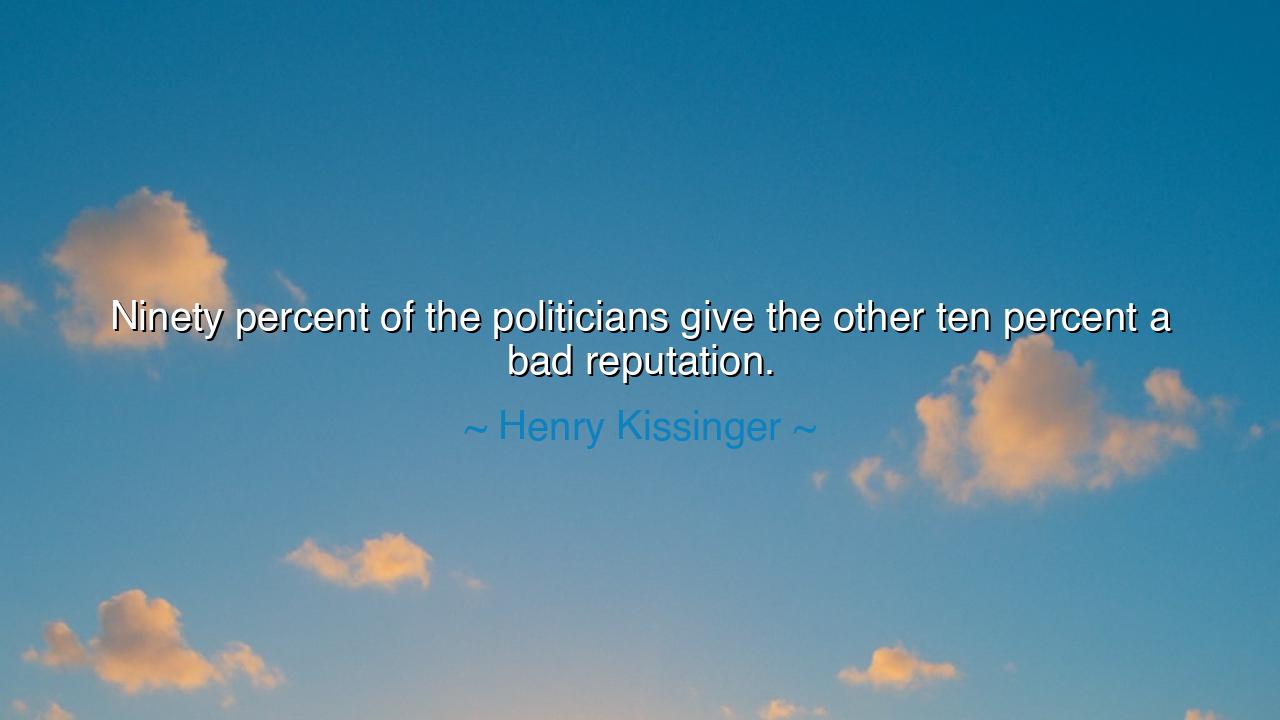
Ninety percent of the politicians give the other ten percent a






The words of Henry Kissinger — “Ninety percent of the politicians give the other ten percent a bad reputation.” — are cast in the form of jest, yet within them lies the sorrow of truth. With biting irony, Kissinger unmasks the cynicism that has long clung to the realm of governance: that corruption, vanity, and deceit among the many overshadow the rare integrity of the few. His words are not merely a complaint, but a lament for the noble calling of leadership tarnished by the failings of those entrusted with power.
The meaning is clear: the actions of the majority shape the judgment of the whole. When most politicians are seen as self-serving, the honest and virtuous few are drowned in suspicion, their honor dragged through the mud of the many. Thus, the noble ten percent, who would serve the people with courage and truth, are made to suffer under the same scorn as those who betray their trust. Kissinger, himself no stranger to the storms of reputation, understood the bitter irony of a world where goodness is hidden by the shadow of corruption.
History offers us vivid illustrations of this truth. In the waning days of the Roman Republic, figures like Cicero, who sought to defend the ideals of the Republic, were often dismissed or mistrusted because of the rampant corruption of their peers. Bribes, backroom deals, and betrayals became the norm, and so even those who labored for the good of Rome were looked upon with the same weary disdain as the schemers. In this way, the reputation of all politicians was tainted by the sins of the many.
And yet, Kissinger’s words also carry a lesson. They remind us that it is not enough to lament the ninety percent; the ten percent must stand as beacons of integrity. Though mocked, doubted, or ignored, they are the guardians of trust, the reminders that leadership can still be honorable. Their struggle is heavier because of the failings of others, but their light shines brighter for the darkness around them.
Let this wisdom be handed down: scorn the corrupt, but do not forget the faithful. For in every age, the cynicism of the multitude has threatened to bury the virtue of the few. And yet it is always the few — the ten percent of true servants — who, by their courage and constancy, preserve the hope that governance can yet be noble. Kissinger’s jest, though sharp, is also a summons: to discern, to honor, and to guard the rare flame of integrity in the world of politics.






HSHong Son
This is a rather blunt assessment of politics, but it feels too easy to dismiss it as just cynicism. What if there’s some truth to it? It raises the question of whether we, as voters, are inadvertently enabling this dynamic by not holding politicians accountable enough. Do we focus too much on the negativity surrounding politics and ignore the potential for positive change from those who are genuinely committed?
MNLu Huynh Mai No
The quote seems to criticize not just individual politicians, but the system itself. Could it be that politics inherently encourages behavior that harms public trust? What would need to change in politics for the ten percent of truly dedicated politicians to be more visible and valued? Or, is it a system designed in such a way that it’s almost impossible for the good ones to shine?
TNCao Thi Nghia
Kissinger’s remark speaks to the problem of generalization. It’s easy to lump all politicians together based on the actions of a few. But does this prevent us from recognizing those who genuinely work for the betterment of society? How do we shift our perspective to focus on the positive contributions, rather than be blinded by the flaws of the majority?
TDThuy Tien Dao
This quote feels like a stark commentary on the power dynamics in politics. If the majority are not acting with integrity, it naturally casts a shadow on the few who are. Is this a sign of a deeper issue within political systems, or is it just an inherent flaw in human behavior? How do we break out of this cycle and start seeing politicians for their true potential rather than their failings?
DTDuy Thanh
Henry Kissinger's statement seems to capture the frustration many people feel with politics. It's easy to feel disillusioned when it seems like most politicians are only in it for their own gain, while the ones who genuinely want to improve things are overshadowed. But is it fair to judge the whole system based on the actions of a few? Are there any real solutions to this widespread skepticism toward politicians?